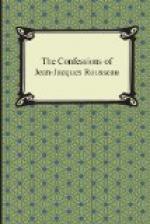I was, therefore, an ardent Frenchman; this rendered me a politician, and I attended in the public square, amid a throng of news-mongers, the arrival of the post, and, sillier than the ass in the fable, was very uneasy to know whose packsaddle I should next have the honor to carry, for it was then supposed we should belong to France, and that Savoy would be exchanged for Milan. I must confess, however, that I experienced some uneasiness, for had this war terminated unfortunately for the allies, the pension of Madam de Warrens would have been in a dangerous situation; nevertheless, I had great confidence in my good friends, the French, and for once (in spite of the surprise of M. de Broglio) my confidence was not ill-founded—thanks to the King of Sardinia, whom I had never thought of.
While we were fighting in Italy, they were singing in France: the operas of Rameau began to make a noise there, and once more raise the credit of his theoretic works, which, from their obscurity, were within the compass of very few understandings. By chance I heard of his ’Treatise on Harmony’, and had no rest till I purchased it. By another chance I fell sick; my illness was inflammatory, short and violent, but my convalescence was tedious, for I was unable to go abroad for a whole month. During this time I eagerly ran over my Treatise on Harmony, but it was so long, so diffuse, and so badly disposed, that I found it would require a considerable time to unravel it: accordingly I suspended my inclination, and recreated my sight with music.
The cantatas of Bernier were what I principally exercised myself with. These were never out of my mind; I learned four or five by heart, and among the rest, ‘The Sleeping Cupids’, which I have never seen since that time, though I still retain it almost entirely; as well as ’Cupid Stung by a Bee’, a very pretty cantata by Clerambault, which I learned about the same time.
To complete me, there arrived a young organist from Valdoste, called the Abbe Palais, a good musician and an agreeable companion, who performed very well on the harpsichord; I got acquainted with him, and we soon became inseparable. He had been brought up by an Italian monk, who was a capital organist. He explained to me his principles of music, which I compared with Rameau; my head was filled with accompaniments, concords and harmony, but as it was necessary to accustom the ear to all this, I proposed to Madam de Warrens having a little concert once a month, to which she consented.
Behold me then so full of this concert, that night or day I could think of nothing else, and it actually employed a great part of my time to select the music, assemble the musicians, look to the instruments, and write out the several parts. Madam de Warrens sang; Father Cato (whom I have before mentioned, and shall have occasion to speak of again) sang likewise; a dancing—master named Roche, and his son, played on the violin; Canavas, a Piedmontese musician (who was employed like myself in the survey, and has since married at Paris), played on the violoncello; the Abbe Palais performed on the harpsichord, and I had the honor to conduct the whole. It may be supposed all this was charming; I cannot say it equalled my concert at Monsieur de Tretoren’s, but certainly it was not far behind it.




